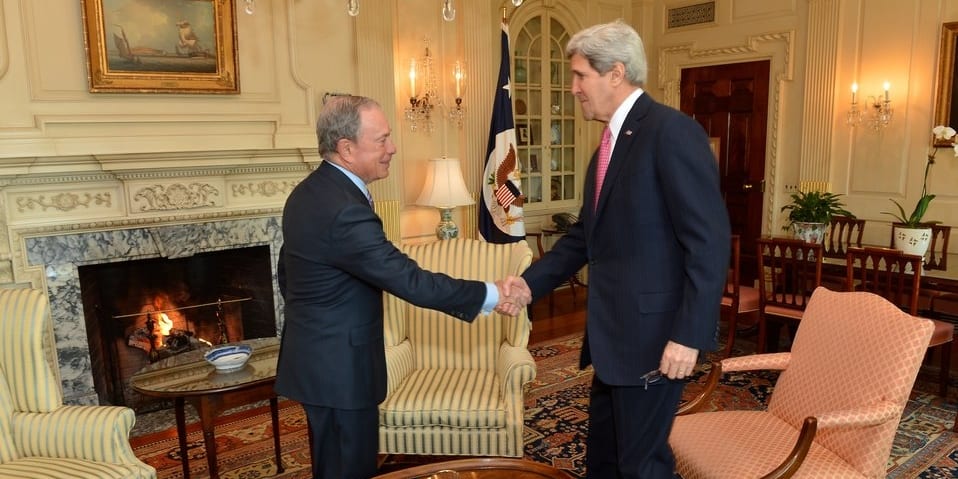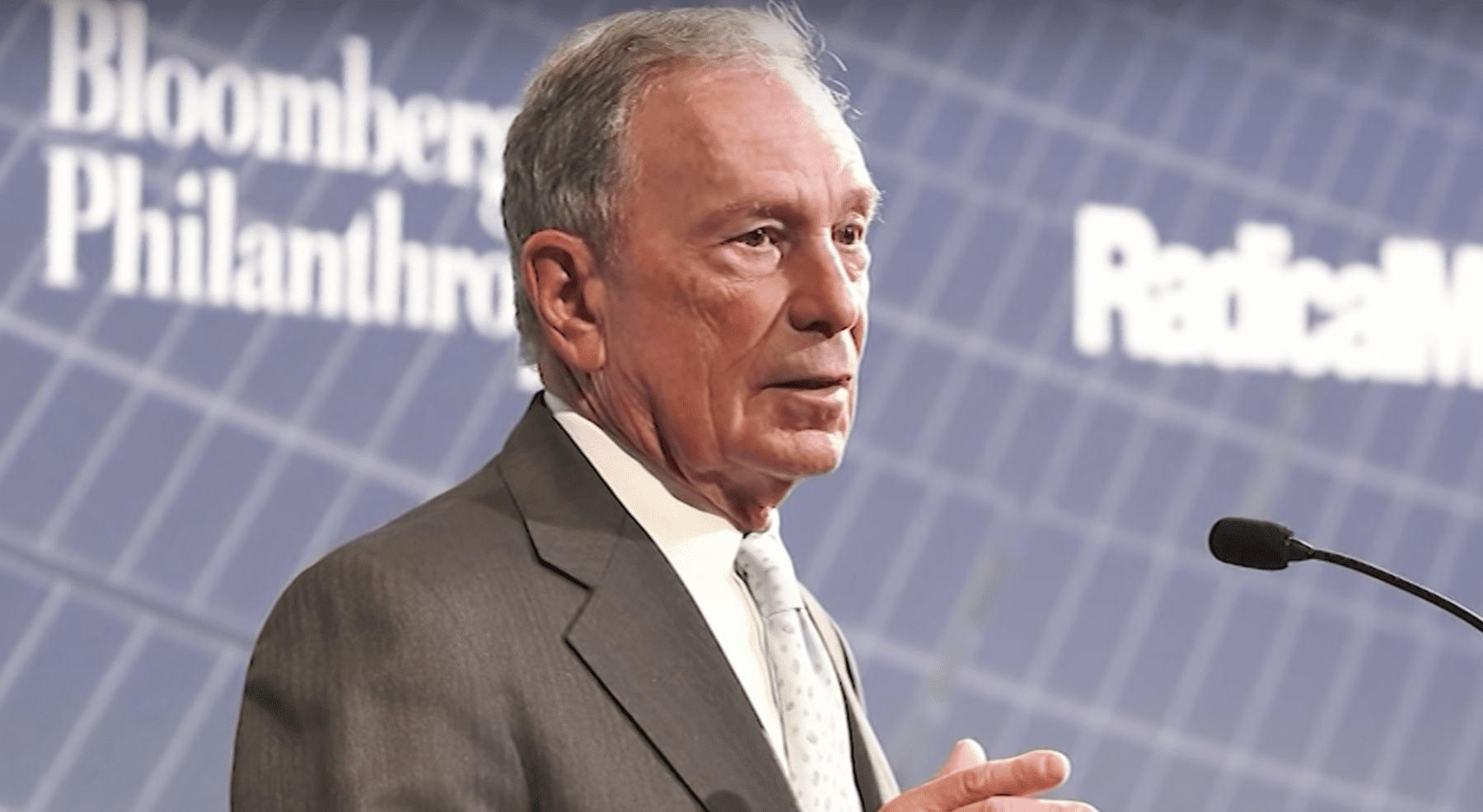
On Thursday evening, the New York Times broke the news: Billionaire businessman and former New York Mayor Michael Bloomberg is “actively” preparing to take the plunge, that is, filing paperwork to run as a Democrat in the 2020 Presidential election. Whether he goes through with it and launches a full campaign are open questions.
Bloomberg, 77, is worth somewhere in the neighborhood of $50 billion. Given skeptical coverage of Senators Warren and Sanders, both of whom have proposed aggressive income and wealth taxes on the richest Americans—certainly including the former mayor—some on social media already were having a field day playing with this (as-yet vague and unconfirmed) move.
Michael Bloomberg is just what this primary cycle needs: a tiny, sentient yacht who is friends with your landlord
— Kate Aronoff (@KateAronoff) November 7, 2019
Mike Bloomberg saw what happened to that Starbucks guy and was like, that should be me
— Haymarket Books (@haymarketbooks) November 7, 2019
If billionaires are worried, they should just get a second job and try to be better at saving https://t.co/CoEtruPVkm
— Senator Megan Hunt (@NebraskaMegan) November 7, 2019
https://twitter.com/themaxburns/status/1192570287054827522
LATE BLOOMER
— Ariel Edwards-Levy (@aedwardslevy) November 7, 2019
Billions of Problems?
Mayor Bloomberg had a complicated record on LGBTQ+ issues while leading New York—failing LGBTQ youth by slashing budgets for programs meant to support them, yet forcefully pushing for marriage equality ahead of the curve—but it’s his conduct toward women, should he enter the race, that is a likelier focus.
Indeed, some immediately (and pointedly) noted on Twitter, generalized optics are the least of Mr. Bloomberg’s challenges. Above all, the former mayor’s reportedly misogynistic, at times outright abusive behavior has lingered in media coverage for decades.
— Tyler Coates (@tylercoates) November 7, 2019
First, there’s the long history of Bloomberg L.P.’s entanglements in sexual harassment lawsuits—Mr. Bloomberg’s eponymous business and media empire—including numerous damning allegations over the years.
Most recently, Bloomberg himself was dropped from a $20 million lawsuit, since he was not “personally liable” for the company’s misconduct having played no “direct role” in the actions described. Said misconduct was egregious, though. The plaintiff’s suit says Nicholas Ferris, described by Law.com as “a former supervisor at the company,” had “harassed and raped her.”
Ferris was fired by Bloomberg last year. (He denies all allegations.)

If this were the only link between Mr. Bloomberg and what The Atlantic’s Megan Garber described as “the underbelly of #MeToo,” then there wouldn’t be much to pin on a would-be candidate. That’s not the case.
Garber’s piece—published in the days when Bloomberg’s candidacy first was a topic of speculation, way back in September 2018—lays out a damning portrait of the potential converted Democrat.
Yes, there are the other “optics” issues laid out by the Times, also in September 2019 (Bloomberg’s defenses of “stop-and-frisk,” his billions in an era of progressive “passions” largely “animated by concern for economic inequality and…civil rights”). But then there are his comments on and conduct toward women.
As Garber explained:
What is not fully addressed in the Times article, however—and what is not fully explored in the many similar pieces that consider the current iteration of Mike Bloomberg’s presidential ambitions—is a series of stories about him, accumulated over decades, that suggests in the aggregate a distinct pattern when it comes to his treatment of women: reports of disparaging comments made about women’s bodies and appearances. Allegations of a deeply sexist work environment at the company that Bloomberg founded and, for many years, ran. Stories that linger like exhaust in the air every time Mike Bloomberg is mentioned as, potentially, the next president of the United States.
Parsing decades of conduct as “insidious manifestations of misogyny,” Garber catalogues various lawsuits (from as early as 1996 into the 2010s) against Bloomberg L.P.; his abusive comments to women working at the company, including about subordinates’ pregnancies, “appearance and sexual desirability” and more; and his much-covered statement “I’d do her,” in reference to another employee (and, among all of these, the only allegation which Mr. Bloomberg was willing to “concede”).
Then there’s the notorious comment he made to a journalist: “Look at the ass on her.” And there are his repeated comments within earshot of former aides (“Nice tits”). And his “mocking,” derisive comments on female politicians in New York, such as then-speaker of New York City Council Christine Quinn. (Again, Mr. Bloomberg denies these accusations.)
Business Insider added, just days before Garber’s article, Bloomberg’s galling defenses of Charlie Rose, the disgraced talk-show host who was fired by CBS after eight women said he had harassed or physically assaulted them over decades. By May 2018, at least 35 women had come forward against Rose in total.
In that context—and with all this information widely known by September 2018—Mr. Bloomberg later expressed “doubts” about the #MeToo movement altogether.
The New York Politics Abyss
To be sure, New York City politics can be a cesspool of abusive, misogynistic conduct. Look no further than last week’s Daily News op-ed from Chloë Rivera, detailing an alarming range of behaviors from Councilman Andy King, including the four charges of “retaliation, disorderly conduct, conflicts of interest and harassment” substantiated by his colleagues, not to mention other behaviors not “substantiated” by the Council.
All of this is to say New York’s powerful men have a longstanding history of abusive, predatory treatment of women. It doesn’t absolve anyone – but it sets a troubling backdrop for any discussion of Mr. Bloomberg, former apex of the city’s politics.
Over three years ago, Alex Pareene reported at Gawker (R.I.P.) many of the foregoing allegations, reframing then-contemporaneous coverage of Bloomberg’s bizarre 2016 DNC endorsement of Hillary Clinton as an “odd” elision of his own conduct.
Michael Bloomberg’s 2016 DNC speech, where he made the “independent’s case” for then-nominee Clinton. (Video via PBS Newshour)
Pareene’s closing observation feels apropos today: “For a party that is pushing for national paid family leave and ending the wage gap, Michael Bloomberg seems an odd person to invite into the big tent.”
To extend that, for a party facing a man in the general election who embodies violent, destructive misogyny in its most-egregious form, embracing a different billionaire often described as an inveterate misogynist would be an even odder fit.
Reflexive impunity for the already-powerful men of this era is, or ought to be, untenable.
Computer simulation of Bloomberg 2020 pic.twitter.com/S1CPhipFQk
— Nick Wiger (@nickwiger) November 7, 2019
(Sources: New York Times, Law.com, The Atlantic, Business Insider, New York Daily News, Gawker)
